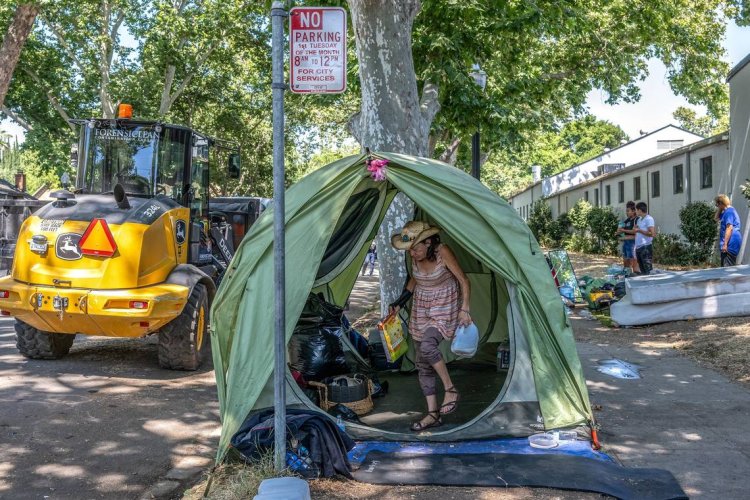Despite what Sacramento DA Thien Ho might say, being unhoused isn’t a crime | Opinion
The solution to the homelessness crisis in Sacramento and other California cities will not be found through law enforcement; the law is clear that a city cannot make it a crime or a public nuisance for people to sleep in public unless there are adequate humane alternatives. That’s why Sacramento County District Attorney Thien Ho is plainly wrong in his threat to investigate city officials for failing to enforce state public nuisance laws and allowing homeless encampments within the city limits.No one disputes that homelessness is a serious problem in every major city in California. There are many causes of the problem, but especially a statewide shortage of affordable housing. No easy solutions exist, and every city is struggling with finding ways of providing shelter for their unhoused.OpinionWhat is clear is that cities cannot make it a crime or a public nuisance for people to be homeless when there is not adequate shelter space.In Martin v. City of Boise, in 2018, the U.S. Court of

The solution to the homelessness crisis in Sacramento and other California cities will not be found through law enforcement; the law is clear that a city cannot make it a crime or a public nuisance for people to sleep in public unless there are adequate humane alternatives. That’s why Sacramento County District Attorney Thien Ho is plainly wrong in his threat to investigate city officials for failing to enforce state public nuisance laws and allowing homeless encampments within the city limits.
No one disputes that homelessness is a serious problem in every major city in California. There are many causes of the problem, but especially a statewide shortage of affordable housing. No easy solutions exist, and every city is struggling with finding ways of providing shelter for their unhoused.
Opinion
What is clear is that cities cannot make it a crime or a public nuisance for people to be homeless when there is not adequate shelter space.
In Martin v. City of Boise, in 2018, the U.S. Court of Appeals for the Ninth Circuit ruled that the Eighth Amendment, which outlaws cruel and unusual punishment, “prohibits the imposition of criminal penalties for sitting, sleeping or lying outside on public property for homeless individuals who cannot obtain shelter.”
Just last month, the Ninth Circuit reaffirmed this in Johnson v. City of Grants Pass. The court declared an Oregon city’s ordinance was unconstitutional when it stated that “no person may sleep on public sidewalks, streets or alleyways at any time as a matter of individual and public safety.”
The city’s ordinance also precluded homeless persons from using a blanket, a pillow or a cardboard box for protection from the elements while sleeping within the city’s limits. The Ninth Circuit also declared this unconstitutional because the government cannot punish people — criminally or civilly — for being unhoused.
These decisions are correct; every human being must sleep. It is cruel and unusual punishment to punish people for conduct where they have no alternative. If there are not adequate shelter beds — which there aren’t in California — then people have no choice but to sleep on public sidewalks and in parks, and they need blankets and cardboard for warmth.
Given this context, District Attorney Ho’s threats against Sacramento city officials are unfounded and misguided.
In a letter to members of the Sacramento City Council, Ho rightly declared that “(b)eing unhoused is not a crime and we should not seek to criminalize homelessness.” But then he makes clear that is exactly what he wants to do.
“However, my office has a duty to prosecute offenses in violation of California’s criminal statutes,” he wrote. “In fact, the Sacramento District Attorney’s Office has entire units dedicated to prosecuting misdemeanor and felony cases. The responsibility to enforce and prosecute Sacramento City Ordinances and Code violations rests squarely upon the City of Sacramento and the City Attorney’s Office.”
Ho goes even further in his suggestion that he is investigating Sacramento city officials for their failure to take action against the unhoused. The DA is seriously overstepping his authority here. His role is to prosecute crimes; it is just wrong to suggest that city officials might have committed a crime by not enforcing laws, let alone criminal laws that they cannot constitutionally enforce against the unhoused.
Sacramento City Attorney Susana Alcala Wood has publicly responded to Ho and pointed out that his letter misinterprets federal court decisions and that he wrongly asserts that California law imposes on government agencies “an affirmative obligation to eliminate public nuisances on their property.”
The solution to the problem of homelessness is not going to emerge from this unnecessary dispute among government officials or from actions of the DA’s office. Being homeless cannot be made a crime or a public nuisance.
The answer, as difficult as it is to find, must come through building more shelters and providing more services.
It is possible that the dispute between the DA and the city attorney could go to court if Ho decides to initiate an action against city officials. Such a suit would be frivolous and likely to be quickly thrown out of court. If Ho decides to initiate prosecutions against the unhoused, these will fail based on the Ninth Circuit’s decisions. Indeed, there almost certainly would be a suit in federal court to enjoin Ho, which will make it back to the court of appeals in a year or two.
That will provide the Ninth Circuit with another chance to reaffirm a basic principle of law and human decency: The government cannot make it a crime for a person to sleep in public if there is nowhere else for them to sleep.
Erwin Chemerinsky is the dean and a professor at the UC Berkeley School of Law.
What's Your Reaction?






















